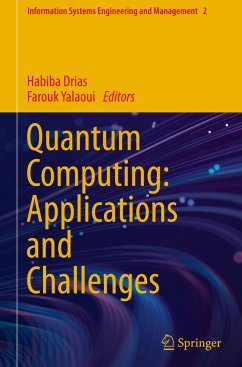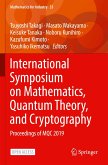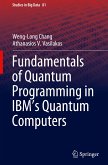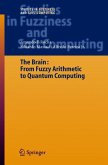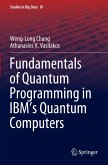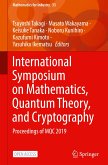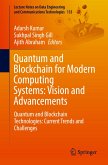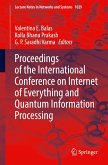Quantum Computing: Applications and Challenges
Herausgegeben:Drias, Habiba; Yalaoui, Farouk
Quantum Computing: Applications and Challenges
Herausgegeben:Drias, Habiba; Yalaoui, Farouk
- Gebundenes Buch
- Merkliste
- Auf die Merkliste
- Bewerten Bewerten
- Teilen
- Produkt teilen
- Produkterinnerung
- Produkterinnerung
This book is intended for academics, researchers, Ph.D. students, and industrials to learn about quantum computing and prepare them to understand the future with its cutting-edge tools. Quantum computing holds great promise in terms of human life quality especially when combined with artificial intelligence.
In addition to quantum computing, the book focuses on quantum artificial intelligence, quantum machine and deep learning, quantum cryptography, and quantum logistics optimization. Applications in weather forecasting, digital soil mapping, skin lesion classification, combinatorial…mehr
Andere Kunden interessierten sich auch für
![International Symposium on Mathematics, Quantum Theory, and Cryptography International Symposium on Mathematics, Quantum Theory, and Cryptography]() International Symposium on Mathematics, Quantum Theory, and Cryptography30,99 €
International Symposium on Mathematics, Quantum Theory, and Cryptography30,99 €![Fundamentals of Quantum Programming in IBM's Quantum Computers Fundamentals of Quantum Programming in IBM's Quantum Computers]() Weng-Long ChangFundamentals of Quantum Programming in IBM's Quantum Computers75,99 €
Weng-Long ChangFundamentals of Quantum Programming in IBM's Quantum Computers75,99 €![The Brain: Fuzzy Arithmetic to Quantum Computing The Brain: Fuzzy Arithmetic to Quantum Computing]() Armando Freitas RochaThe Brain: Fuzzy Arithmetic to Quantum Computing75,99 €
Armando Freitas RochaThe Brain: Fuzzy Arithmetic to Quantum Computing75,99 €![Fundamentals of Quantum Programming in IBM's Quantum Computers Fundamentals of Quantum Programming in IBM's Quantum Computers]() Weng-Long ChangFundamentals of Quantum Programming in IBM's Quantum Computers49,99 €
Weng-Long ChangFundamentals of Quantum Programming in IBM's Quantum Computers49,99 €![International Symposium on Mathematics, Quantum Theory, and Cryptography International Symposium on Mathematics, Quantum Theory, and Cryptography]() International Symposium on Mathematics, Quantum Theory, and Cryptography38,99 €
International Symposium on Mathematics, Quantum Theory, and Cryptography38,99 €![Quantum and Blockchain for Modern Computing Systems: Vision and Advancements Quantum and Blockchain for Modern Computing Systems: Vision and Advancements]() Quantum and Blockchain for Modern Computing Systems: Vision and Advancements117,69 €
Quantum and Blockchain for Modern Computing Systems: Vision and Advancements117,69 €![Proceedings of the International Conference on Internet of Everything and Quantum Information Processing Proceedings of the International Conference on Internet of Everything and Quantum Information Processing]() Proceedings of the International Conference on Internet of Everything and Quantum Information Processing127,99 €
Proceedings of the International Conference on Internet of Everything and Quantum Information Processing127,99 €-
-
-
This book is intended for academics, researchers, Ph.D. students, and industrials to learn about quantum computing and prepare them to understand the future with its cutting-edge tools. Quantum computing holds great promise in terms of human life quality especially when combined with artificial intelligence.
In addition to quantum computing, the book focuses on quantum artificial intelligence, quantum machine and deep learning, quantum cryptography, and quantum logistics optimization. Applications in weather forecasting, digital soil mapping, skin lesion classification, combinatorial optimization, and urgent transportation, among others, are presented.
In addition to quantum computing, the book focuses on quantum artificial intelligence, quantum machine and deep learning, quantum cryptography, and quantum logistics optimization. Applications in weather forecasting, digital soil mapping, skin lesion classification, combinatorial optimization, and urgent transportation, among others, are presented.
Produktdetails
- Produktdetails
- Information Systems Engineering and Management 2
- Verlag: Springer / Springer Nature Switzerland / Springer, Berlin
- Artikelnr. des Verlages: 978-3-031-59317-8
- 2024
- Seitenzahl: 232
- Erscheinungstermin: 13. Juni 2024
- Englisch
- Abmessung: 241mm x 160mm x 19mm
- Gewicht: 461g
- ISBN-13: 9783031593178
- ISBN-10: 3031593170
- Artikelnr.: 70238482
- Herstellerkennzeichnung Die Herstellerinformationen sind derzeit nicht verfügbar.
- Information Systems Engineering and Management 2
- Verlag: Springer / Springer Nature Switzerland / Springer, Berlin
- Artikelnr. des Verlages: 978-3-031-59317-8
- 2024
- Seitenzahl: 232
- Erscheinungstermin: 13. Juni 2024
- Englisch
- Abmessung: 241mm x 160mm x 19mm
- Gewicht: 461g
- ISBN-13: 9783031593178
- ISBN-10: 3031593170
- Artikelnr.: 70238482
- Herstellerkennzeichnung Die Herstellerinformationen sind derzeit nicht verfügbar.
After obtaining her baccalaureate in mathematics in 1975, Habiba Drias pursued a degree in computer science engineering at the University of Science and Technology of Algiers (USTHB) from 1975 to 1980. Following this, she pursued a Master of Science in Computer Science at Case Western Reserve University, Cleveland Ohio USA. Subsequently, she embarked on a career as a teacher-researcher at the USTHB in 1984. From 1988 to 1992, she undertook Ph.D. studies in computer science in Paris6 France, successfully defending her thesis in 1993. She achieved the rank of Full Professor in 1999. Habiba Drias served as the Director of the Computer Science Institute at the USTHB from 1995 to 1998. Between 2003 and 2008, she held the position of General Director at the National Institute of Informatics. Currently, since 2000, she has been leading the Artificial Intelligence Research Laboratory. On the educational front, she has imparted knowledge in computer science, specializing in areas such as computer architecture, computational complexity, language compilation, and operating systems. Additionally, she has taught courses in artificial intelligence, including problem solving, multi-agents systems, data mining, machine learning, and swarm intelligence. In 2009, she founded the master's degree program in intelligent computer systems at the USTHB. Throughout her career, she authored three books that she utilizes in her teaching. In terms of research, Habiba Drias has published around 300 articles in international journals and conferences, garnering over 2500 citations on Google Scholar. Her recent research in quantum computing, artificial intelligence, problem solving, data mining, and information retrieval has made significant contributions to the scientific and technological fields. She has also supervised 29 Ph.D. theses, 37 master's theses, 31 state engineering projects, and 20 master's projects. Her scholarly works under Springer and IEEE, as well as a Scopus journal issue, contribute to her publishing record. Additionally, she is an expert for French ANR agency, a member of the reviewing committee for the journal 'Applied Intelligence,' with an impact factor of 5.3, as well as an associate editor in a Scopus-indexed journal. In recognition of her achievements, Habiba Drias received the Scopus-Algeria prize in computer science in 2013. Since June 2015, she has been a founding member of the Algerian Academy of Sciences and Technologies (AAST). Farouk Yalaoui is a full Professor at Troyes University of Technology (UTT), France, currently serving as the Senior Vice President for Research at UTT. He holds the position of scientific director of the Industrial Chair "Connected Innovation" at UTT since 2011. Farouk Yalaoui has an extensive academic background, including an Engineering degree in Industrial Engineering from the Polytechnics School of Algiers, a master's degree in industrial system engineering from Polytechnics Institute of Lorraine, a Ph.D. degree in Production Management from UTT, and a Habilitation à diriger les recherches (Dr. Hab) from Compiegne University of Technology. His research focuses on scheduling problems, system design, operations research, logistics and production systems optimization, reliability, maintenance optimization, and general optimization problems. Farouk Yalaoui has supervised numerous Ph.D. theses and projects since 2001 and is a founder and partner of OPTA LP SAS company since 2013. He has authored or co-authored over 500 contributions, publications, and communications, including edited books, book chapters, and papers in various journals and conference proceedings. Farouk Yalaoui is actively involved in the academic community, serving on editorial boards, as an editor for international journals, and participating in numerous conferences. He has received recognition for his contributions, including being a member of the Algerian Academy of Science and Technology (AAST) since 2015 and receiving the Annual Award 2017 of the IFAC French National Member Organization (NMO). Additionally, he holds various leadership roles in professional organizations and committees, both nationally and internationally. He is Vice Chair of IFAC (International federation of Automation and Control) TC group 5.2. He is member of French Universities National Council (CNU) field Automation, Control, Industrial Engineering (section 61). He is member and expert for French ANR agency.
Chapter 1. An Overview of Quantum Key Agreement Protocols.- Chapter 2. Variational Circuit based Hybrid Quantum-Classical Algorithm VC-HQCA.- Chapter 3 Quantum computing in Non Destructive Testing of Materials.- Chapter 4. Enhanced Gaussian Quantum Particle Swarm Optimization for the Clustering of Biomedical Data.- Chapter 5. Quantum Inspired Grey Wolf Optimizer for Convolutional Neural Network Hyperparameter Optimization.- Chapter 6. Frequent itemsets mining using new quantum inspired elephant swarm algorithm.- Chapter 7. Quantum Slime Mould Algorithm and application to urgent transportation.- Chapter 9. Quantum FP-Growth for Association Rules Mining.- Chapter 10 Gaussian Quantum-behaved PSO strategy for Lithium Battery model optimization.- Chapter 11. Quantum Recurrent Neural Networks for Soil Profiles Prediction in Türkiye.- Chapter 12. Q-CODA: Co-Designing Quantum Codes and Architectures for Hardware-Aware Quantum Error Correction.- Chapter 13. Quantum Computing for Computer Vision: Applications, Challenges, and Research Tracks.- Chapter 14. A multiparty efficient semi-quantum secret sharing protocol of specific bits.- Chapter 15. Quantum Convolution for Convolutional Neural Networks.- Chapter 16. A Quantum-Inspired Deep Learning Models for Skin Lesion Classification.
Chapter 1. An Overview of Quantum Key Agreement Protocols.- Chapter 2. Variational Circuit based Hybrid Quantum-Classical Algorithm VC-HQCA.- Chapter 3 Quantum computing in Non Destructive Testing of Materials.- Chapter 4. Enhanced Gaussian Quantum Particle Swarm Optimization for the Clustering of Biomedical Data.- Chapter 5. Quantum Inspired Grey Wolf Optimizer for Convolutional Neural Network Hyperparameter Optimization.- Chapter 6. Frequent itemsets mining using new quantum inspired elephant swarm algorithm.- Chapter 7. Quantum Slime Mould Algorithm and application to urgent transportation.- Chapter 9. Quantum FP-Growth for Association Rules Mining.- Chapter 10 Gaussian Quantum-behaved PSO strategy for Lithium Battery model optimization.- Chapter 11. Quantum Recurrent Neural Networks for Soil Profiles Prediction in Türkiye.- Chapter 12. Q-CODA: Co-Designing Quantum Codes and Architectures for Hardware-Aware Quantum Error Correction.- Chapter 13. Quantum Computing for Computer Vision: Applications, Challenges, and Research Tracks.- Chapter 14. A multiparty efficient semi-quantum secret sharing protocol of specific bits.- Chapter 15. Quantum Convolution for Convolutional Neural Networks.- Chapter 16. A Quantum-Inspired Deep Learning Models for Skin Lesion Classification.

